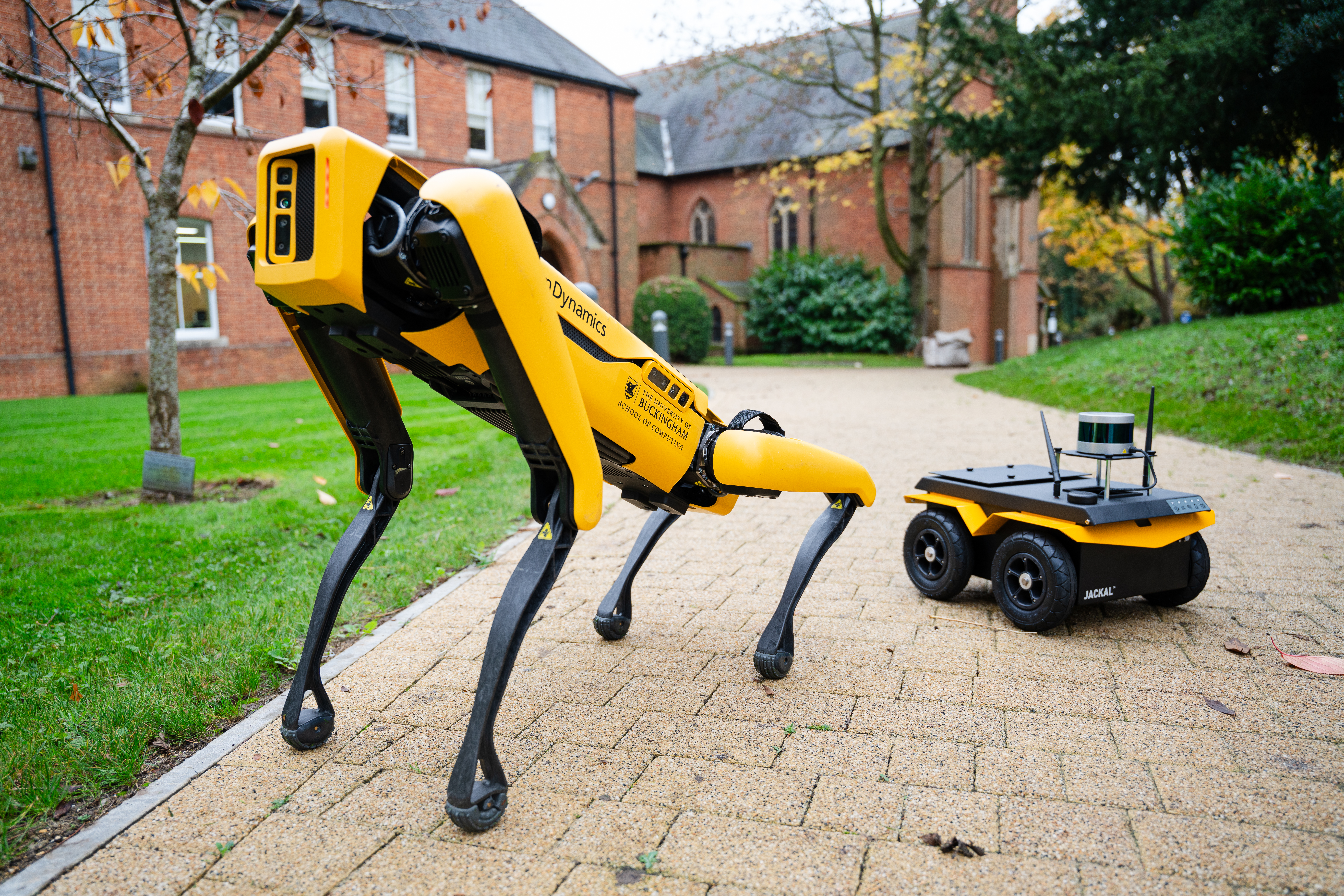As job openings hit a three-year low for information technology (IT) in 2024, it goes without saying that the industry is as competitive as ever. In a market that is as saturated as software engineering and IT, mediocrity is unacceptable. Enter The University of Buckingham, where the School of Computing has been ranked first in the UK for Teaching in the Guardian University Guide 2025. Here’s where world-class faculty members are committed to your specialised development in computing until you’re stacked with an in-demand skill set — and their multiple accolades showcase just how committed they are to teaching and graduate prospects.
Graduates are living proof of the university’s career-driven approach, as they’ve gone to work with technology leaders the likes of Amazon, BAE Systems, Microsoft, Jaguar Land Rover, Meta, Adobe, and more. They stand out for their competence and confidence in the worlds of data analytics, artificial intelligence, cyber security, cloud computing, Internet of Things (IOT), software development, virtual reality, and robotics.
Expert faculty and effective methodologies
The making of competitive graduates starts with professors who understand exactly what the industry needs — at The University of Buckingham, that’s not in short supply. Research-active academics have spent their careers working on industry projects. They can and have always shared their expertise with students – made possible by small classes that let them reach each and every student. Buckingham students liked this approach a lot, voting the university into the top 10 for overall positivity score in the National Student Survey 2024.
Having expert faculty members is one of the reasons why Ilesanmi Ayomide Queen Elizabeth, who pursued the BSc (Hons) Computing, walked away with a well-rounded skill set prepared to thrive in her career. “It was beautiful to see their exceptional dedication and selflessness to their roles. This is what I believe makes them stand out,” says the 21-year-old from Nigeria. “They fostered a welcoming and inclusive environment where every student felt valued and supported.”

The University of Buckingham turns students into employable graduates in computer science. Source: The University of Buckingham
Before Elizabeth wound up at The University of Buckingham, she had considered a bigger university in a major city — thinking it would put her in larger classes and a different style of teaching. Choosing to study computing at The University of Buckingham put her in a tight-knit community instead, where it’s easy to go up to professors and peers with questions. “Here I experienced a balanced mix of teaching and assessment methods. The teaching felt much more tailored to students’ needs, with plenty of opportunities for feedback and support along the way,” she says.
Sarah Mathew, who secured a graduate job with the School of Computing’s industry partner Zizo, says, “I’m very thankful to The University of Buckingham for letting me explore computing based on my interests, guiding me through what I needed help to understand and develop, and for connecting me with organisations and people who were interested in my work.”
This being The University of Buckingham, everyone is constantly looking to do better. Every year, all academics undergo at least one Observation of Teaching, Learning and Assessment by a peer to identify good practices and areas for continuous improvement.
Remaining connected with the industry
At The University of Buckingham, education is centred on being prepared for industry. For student Hasan Raza, the journey thus far has been great. “It sounds cheesy – but I sincerely enjoy learning within the environment of The University of Buckingham – I don’t have to drag myself to university; I genuinely want to attend and engage with my course,” he says.
So much so that he’s already confident that he’ll do well in his future career, despite not being a graduate yet.
“The rich, diverse curriculum at The University of Buckingham has conditioned me well for the many facets of the tech industry,” he says. “From exploring technical modules such as the ‘Design, Implementation, and Application of Algorithms’ to delving into design principles in modules such as ‘User Experience and Design,’ I’d say the biggest thing the teaching has instilled is a more analytical, logical style of thinking which makes interacting with computer systems feel very natural.”
The School of Computing enriches computer science learning in many ways. There are sessions with guest speakers from the industry, exposure to cutting-edge research activities, and a final-year project based on the problems faced by University’s industry partners.
For Raza, it was the Skills and Professional Development module that left a deep impact on his perspective. “One of these sessions, presented by Iga Martinez on ‘Grit,’ was very eye-opening for me in terms of some of my own personal shortcomings which I had not identified prior to the session. I’ve been steadily working on that since, which I feel has better equipped me with the skills to be a more attractive candidate when it comes to career opportunities.”

The University of Buckingham’s extensive network of industry partners gives students access to real-world opportunities such as internships and workshops. Source: The University of Buckingham
Setting students up for the real-world
During her time at The University of Buckingham, Elizabeth completed two internships over two summers with the Bright Network Internship Experience UK. She also worked on real-world projects like designing applications — one of them being The University of Buckingham Student Wellness Hub. It became a platform for students to manage their emotional well-being, with features like mood tracking and support from the university’s well-being team. As a student ambassador, she attended networking events and workshops like the weekly computing career sessions facilitated by industry professionals and frequently collaborated with her peers.
“I had the opportunity to engage in activities that went beyond academics, enhanced my professional development, and allowed me to gain hands-on practical experiences that complemented my classroom knowledge,” Elizabeth says.
Part of that was Elizabeth’s proactiveness, but the other part is due to Buckingham’s career-boosting initiatives. The University puts you in micro-internships through the B-Enterprising scheme, where students work on short-term projects with employers. Through this scheme, many graduates have turned this into a full-time role. The Careers and Employability Service provides more opportunities similar to this, including virtual internships.
The best part? These resources remain yours to access even after you’ve graduated.
“I feel as though the diverse nature of the programme has provided a great springboard for career success after the programme concludes,” Raza says. “I’ve built up a holistic, well-rounded knowledge of my field and I feel confident and equipped to take any opportunities presented to me with both hands.”
If that’s the kind of future you want to create, then follow The University of Buckingham on Facebook, X, Instagram, LinkedIn, YouTube and TikTok.












